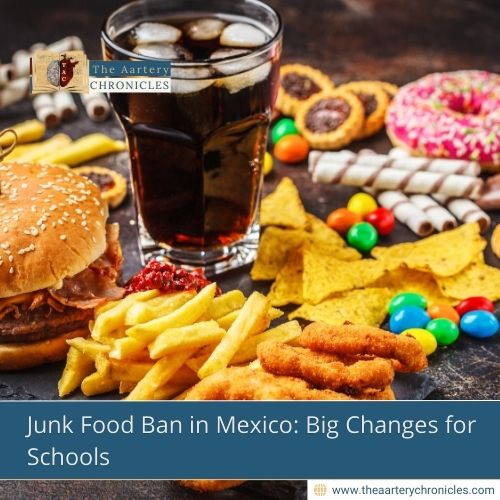

Junk Food Ban in Mexico: Big Changes for Schools
On Saturday, Mexico officially began enforcing a new law banning junk food in schools. This initiative aims to combat the country’s high rates of obesity and diabetes, which are among the worst in the world.
The new health regulations, first introduced last year, prohibit the sale of processed foods high in sugar, salt, calories, and fat. Popular snacks like sugary fruit drinks, packaged chips, artificial pork rinds, and chilli-flavoured peanuts are now banned in schools.
Government’s Commitment to Healthier Eating
Announcing the law on social media, Mexico’s Education Ministry declared, “Farewell, junk food!” and encouraged parents to support the effort by preparing healthier meals for their children.
This policy is part of Mexico’s broader strategy to reshape eating habits and promote healthier choices among young people. Other countries are closely monitoring this move as they also seek ways to tackle the global obesity crisis.
Stricter Rules for School Food
Under the new guidelines, schools must gradually remove all food and drinks that have even one black warning label—Mexico’s front-of-package system that identifies products high in unhealthy ingredients. This labeling system was introduced in 2020 to make consumers more aware of what they are eating.
Starting Monday, schools must offer healthier options like bean tacos instead of processed snacks. Additionally, they are required to provide access to plain drinking water.
Support from Mexico’s Leadership
President Claudia Sheinbaum, a strong advocate for the policy, emphasized the importance of these changes. “It is much better to eat a bean taco than a bag of potato chips,” she stated, reinforcing the government’s push for healthier school meals.
Alarming Childhood Obesity Rates
Mexico has one of the highest rates of childhood junk food consumption in Latin America. According to UNICEF, about 40% of the daily calories consumed by Mexican children come from sugary drinks and highly processed foods. Government data shows that one-third of Mexican children are already classified as overweight or obese.
Strict Penalties for Violators
Another major concern is the sale of junk food just outside school premises. Street vendors commonly sell snacks such as chips, nachos, candy, and ice cream near school gates, making it unclear how the government plans to regulate these sales.
Despite these challenges, Mexico’s new policy is a bold step toward improving children’s health and could serve as a model for other nations fighting obesity and diet-related diseases.
Source: Inputs from various media Sources

Priya Bairagi
Reviewed by Dr Aarti Nehra (MBBS, MMST)
I’m a pharmacist with a strong background in health sciences. I hold a BSc from Delhi University and a pharmacy degree from PDM University. I write articles and daily health news while interviewing doctors to bring you the latest insights. In my free time, you’ll find me at the gym or lost in a sci-fi novel.








